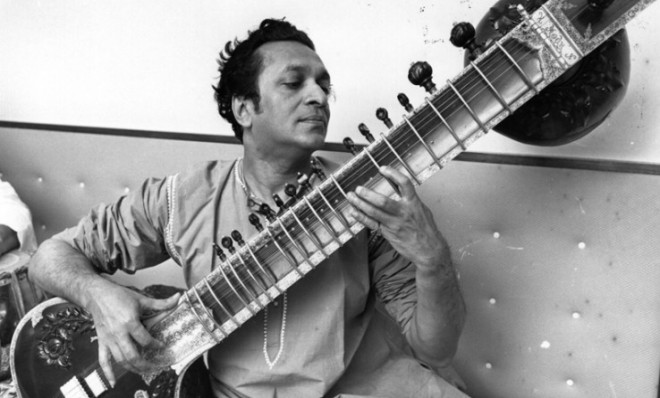Remembering Ravi Shankar: 'The godfather of world music'
The Indian sitar virtuoso credited with introducing Western audiences to the stringed foreign instrument died Tuesday at age 92. A look back at his legacy


A free daily email with the biggest news stories of the day – and the best features from TheWeek.com
You are now subscribed
Your newsletter sign-up was successful
Ravi Shankar, master of the traditional Indian instrument the sitar and muse to the Beatles, died Tuesday at age 92. Dubbed the "godfather of world music" by George Harrison, Shankar is credited with introducing the Western world to the sounds of the sitar. In addition to being survived by his two daughters — sitar player Anoushka Shankar and Grammy-winning singer Norah Jones — Shankar leaves behind a rich legacy of bridging the divide between Eastern and Western music, playing every role from mentor to philanthropist to hippie musical icon throughout his generation-spanning career. Here, colleagues and critics remember the virtuoso:
He used his music to be a cultural ambassador
Shankar "brought me to love Indian classical music," and listening to his music was an incredible "experience had by millions in the West over a period of more than 60 years," says Ivan Hewett at Britain's Telegraph. Through his legendary performances at pop festivals like Monterey and Woodstock and his collaborations with people like George Harrison and John Coltrane, Shankar was able to reach a massive new audience, catapulting him to stardom. And Shankar "liked nothing better than ushering a stranger into the mysteries of the tradition he'd come to embody." There has "never been another proselytizer like Shankar."
The Week
Escape your echo chamber. Get the facts behind the news, plus analysis from multiple perspectives.

Sign up for The Week's Free Newsletters
From our morning news briefing to a weekly Good News Newsletter, get the best of The Week delivered directly to your inbox.
From our morning news briefing to a weekly Good News Newsletter, get the best of The Week delivered directly to your inbox.
His technical skill was unmatched
Shankar's performance style "embodied a virtuosity that transcended musical languages," says Allan Kozinn at The New York Times. He cultivated his own unique voice and identifiable style, "notable for a prominent and resounding lower-register tone and phrasing that was totally his," says Amrit Singh at Stereogum. "You know when it's Ravi playing." Although it took awhile for many Westerners used to rock music to get accustomed to Shankar's "complex rhythms and exceptional virtuosity," says Randy Lewis at the Los Angeles Times, his music opened doors for and gave opportunities to artists from other cultures around the world, and he "continued to be regarded in the West as the most eloquent spokesman for his country's music," says Kozinn.
He pioneered the concept of the benefit concert
After being thrust into the public eye thanks to his mentoring of Harrison, Shankar used his influence and famous friends in 1971 to help organize a benefit concert for Bangladesh, since the country was in the midst of fighting a bloody war for separation from Pakistan. As the donations for refugees poured in, UNICEF dubbed the Concert For Bangladesh the first massive fundraising pop event in history. The concert, which spanned two nights at Madison Square Garden and featured performances from greats like Bob Dylan and Eric Clapton, inspired later benefit shows such as 1985's Live Aid, the 2010 Hope For Haiti Now telethon, and Tuesday's 12-12-12 Concert for hurricane Sandy relief.
A free daily email with the biggest news stories of the day – and the best features from TheWeek.com
He maintained that his music was a natural high
"Ravi Shankar was a virtuoso sitar player long before he became a cult for a drug-fuelled hippy generation" that found his music to be a perfect accompaniment to the experimentation with marijuana and LSD, said Tariq Ali at Britain's Guardian. While he knew that his enormous popularity with hippies was underscored by their drug use, he took every opportunity to emphasize that his music was more than a background soundtrack for a trip — often addressing crowds to tell them that he hoped they enjoyed his music more than they enjoyed taking drugs. "People had this idea that my music was somehow mixed up with the drug culture, that it was a way of losing your consciousness," Shankar told the Telegraph. "But that's so wrong, the tradition is all about achieving an inner purity." Shankar and his music "represented a graceful and heroic alternative to transcendental experience at a time when the world could use one," says Singh. "He was a musical connector, an emissary for Indian culture, and absolutely one-of-a kind."
Watch some Shankar's legendary performances:
Monterey Pop in 1967
A lesson with George Harrison:
1971 Concert For Bangladesh:
Samantha Rollins is TheWeek.com's news editor. She has previously worked for The New York Times and TIME and is a graduate of Northwestern University's Medill School of Journalism.
-
 6 of the world’s most accessible destinations
6 of the world’s most accessible destinationsThe Week Recommends Experience all of Berlin, Singapore and Sydney
-
 How the FCC’s ‘equal time’ rule works
How the FCC’s ‘equal time’ rule worksIn the Spotlight The law is at the heart of the Colbert-CBS conflict
-
 What is the endgame in the DHS shutdown?
What is the endgame in the DHS shutdown?Today’s Big Question Democrats want to rein in ICE’s immigration crackdown
